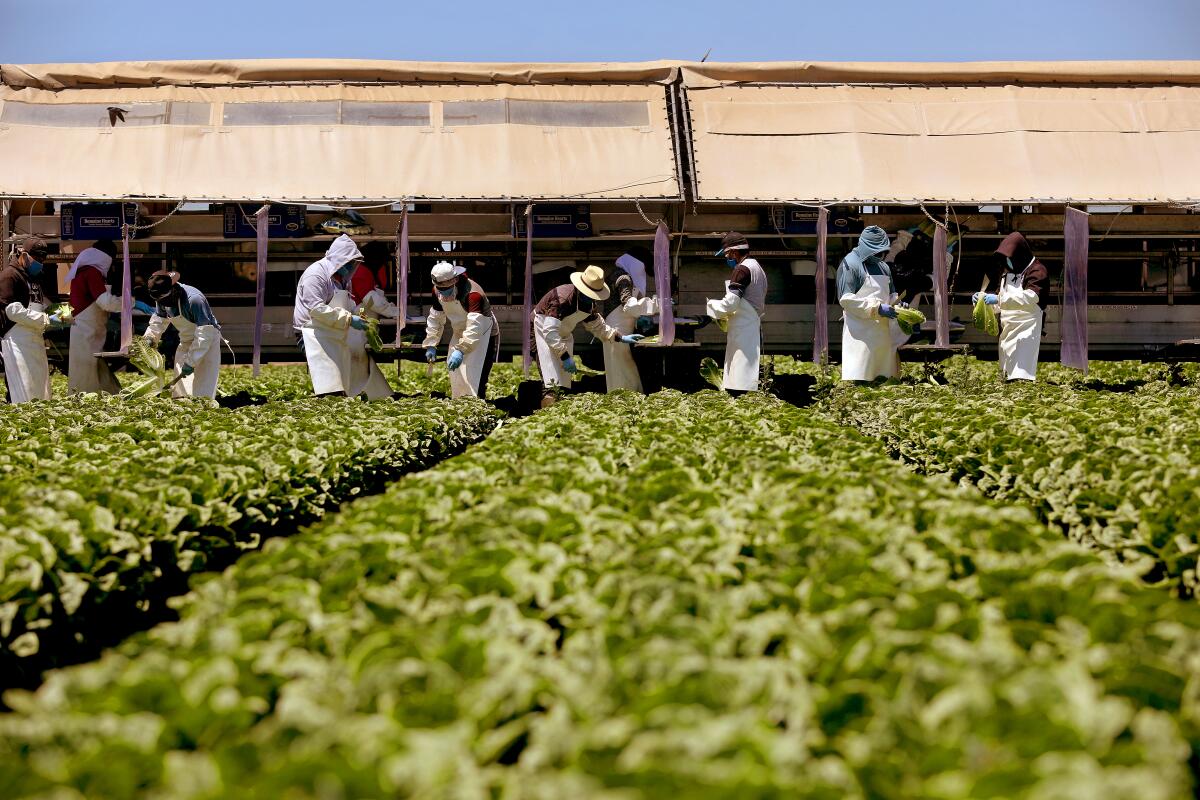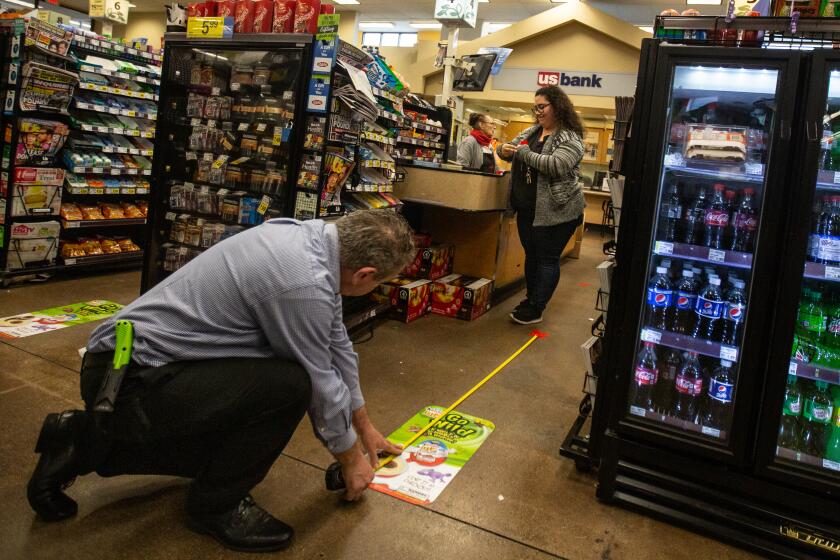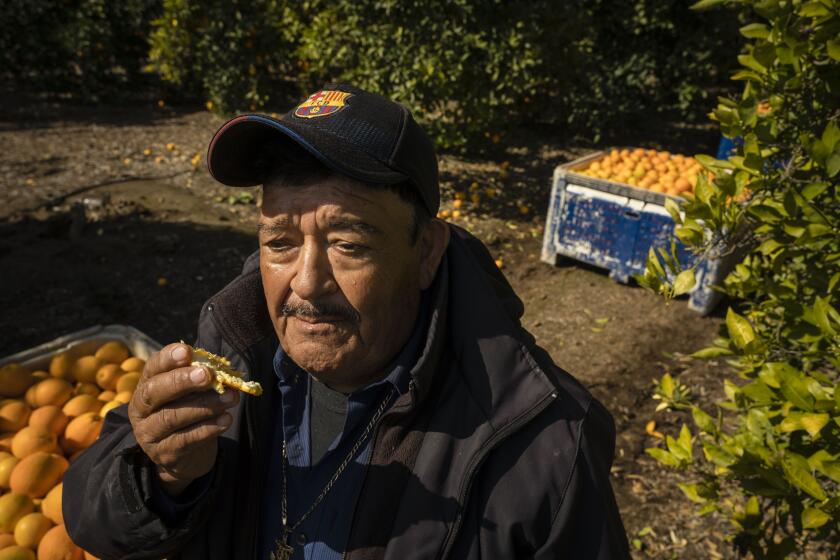Coachella institutes ‘hero pay’ for farmworkers: ‘Part of the cultural ethos’

The city of Coachella late Wednesday passed a mandate for hazard pay for some retail and food workers, including those at grocery stores, restaurants and farms. The city’s mayor said the ordinance is the first in the nation to offer a pandemic pay bump to farmworkers.
The mandate will require agricultural operations, grocery stores, restaurants and retail pharmacy stores within the city to provide a $4-per-hour pay boost to their workers for at least four months, effective immediately. The regulation, approved unanimously by the City Council, will apply to businesses that employ 300 or more workers nationally, and more than five employees in the city.
The move comes as California’s grocery industry mounts an aggressive legal challenge to hazard pay ordinances being introduced across the state. Industry executives and representatives say the additional pay, also known as “hero pay,” is unsustainable even for large grocery chains, pitting businesses against local officials and workers’ advocates as the COVID-19 pandemic drags on.
The Coachella City Council’s initial draft about a month ago included only grocery and pharmacy workers for the pay bump, local officials said. Given that about 8,000 farmworkers live in the broader Coachella Valley, and more than 30% of them live within the city itself, Mayor Steven Hernandez said City Council members thought it was important to add agricultural workers to the proposal.
“We know that COVID has been more prominent in these agricultural communities, and if you look at the mortality rates, a lot of farmworkers have died,” Hernandez said in an interview. “You can see the devastation.”
The L.A. City Council has ordered staff to draft an ordinance requiring big grocery and pharmacy chains to pay workers an extra $5 an hour for 4 months.
A recent UC San Francisco study informed the decision to add farmworkers and restaurant workers in the proposal, he said. The study analyzed state Department of Public Health death records and found that of essential workers, those in food and agricultural jobs ranging from line cooks to field workers, were at highest increased risk of death due to COVID-19.
In particular, Latino food and agriculture workers were disproportionately affected, with a 59% increase in mortality. The study looked at occupations associated with high excess mortality, or more deaths than expected, during the pandemic.
In a letter urging the council to adopt the measure, Coachella’s city manager and the city attorney had cited public health data from Riverside County, where Coachella is located, showing that the highest number of COVID-19 outbreaks in the region — 48 of them — from July to September were reported to stem from grocery stores.
The California Grocers Assn. has sued Long Beach, Oakland and Montebello for approving temporary pay boosts for grocery workers. Kroger, which owns several supermarket chains, announced earlier this month that it would shut down two stores, a Ralphs and a Food 4 Less, in response to Long Beach’s hazard pay law.
The association has said in statements that it intends to continue to challenge pay-bump ordinances with lawsuits. On the Coachella proposal, spokesman Nate Rose pointed to previous comments by California Grocers Assn. President Ron Fong in which Fong cited a 28% increase in labor costs associated with such hikes. Fong has warned of “severe unintended consequences” that the increase will have on grocers, workers and customers alike.
Coachella officials have heard similar concerns. Councilwoman Megan Beaman-Jacinto said she has talked with growers and farmers concerned about the financial stress that such pay hikes could inflict on their companies, including some who lobbied for a separate ordinance for farmworkers.
Others were similarly worried about hurting restaurants whose revenues have been slammed by pandemic restrictions. Beaman-Jacinto said keeping farmworkers, who often have lower wages, in the same proposal as restaurant and pharmacy workers is meant to ensure they have access to the same protections.
On restaurants, she said the ordinance targets larger chains because its effect would be outsized on smaller local businesses.
“We’ve heard that many low-income essential workers continue to work despite symptoms of COVID-19 because they don’t have the financial safety net to stay home,” the councilwoman said. “We’re hoping that’s something we can fix with this ordinance.”
California’s 420,000 farmworkers are working through the crisis. But language barriers and a lack of communication on the coronavirus put many at risk.
Fighting for farmworkers’ rights, in particular, “is part of the cultural ethos of who we are as a city,” Hernandez said. Lionel Steinberg, a major grape grower in Coachella Valley in the 1970s, was the first to sign the historic initial contract with Cesar Chavez and the United Farm Workers in 1970. “The roots of our community are agricultural,” he added, with 122 commodities grown in the region including dates, oranges, lettuce and cannabis.
Companies concerned about the extra expenditure “have a responsibility to their workers who are making them millions and billions,” he said. “I ask these corporations, what is your role in making a better community?”
Jorge Torres, owner of Torres Farms in the valley, said many farms in the area, including his own 19-employee operation, might be too small for the potential new regulation to apply. Still, he welcomed the move. “Farm labor is the lowest pay in the whole industry,” he said. “Additional income, as long as it’s not a burden to the employer, is good for the farmworker.”
Juan Manuel Moran, a United Farm Workers internal organizing coordinator, said farms were already struggling with higher worker pay and may not be able to operate with further wage hikes. Some farms, for example, have been steadily lowering the availability of overtime hours, he said. Hero pay sounds good in theory, he added, but in practice it’s possible that “the worker ends up losing.”
More to Read
Inside the business of entertainment
The Wide Shot brings you news, analysis and insights on everything from streaming wars to production — and what it all means for the future.
You may occasionally receive promotional content from the Los Angeles Times.














